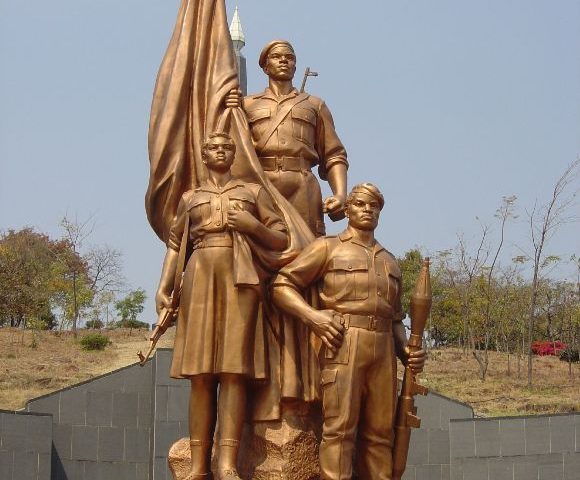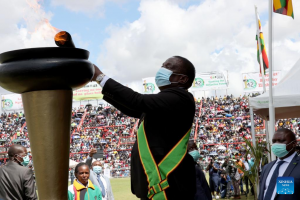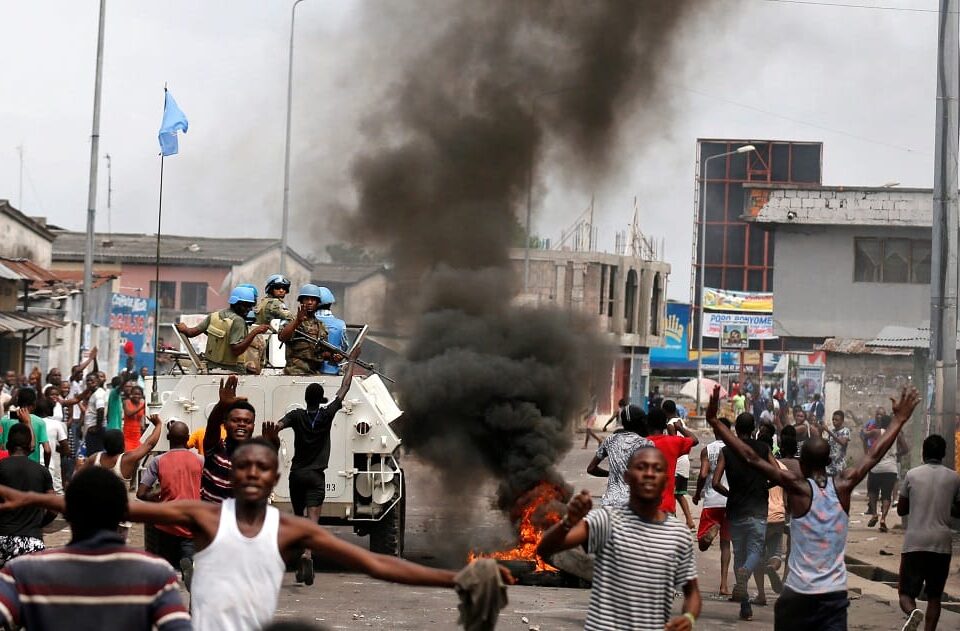
Mutare streets empty in fear of 31st protest calls
March 31, 2025
A good turn deserves another as Dorcas Moyo donates to Victoria Chitepo Hospital, Zororai Old Peoples Home
April 23, 2025Zim @45 deep thoughts on democratic governance and hopes for a better future in the 2nd Republic

The iconic statue of the unknown soldier at the National Heroes Acre.
By Unice Dzakandwa and Prescilla Kashiri
AS Zimbabwe prepares to celebrate its 45th Independence Day celebrations next week Friday (18 April), a lot of feelings always come to mind amongst its people. From the war liberators and collaborators to the present day youths who now enjoy the fruits of independence, many have their own reflections on what Independence Day means to them.
This year’s Independence Day celebrations will be held in Gokwe in Midlands after being hosted by Manicaland last year as the second decentralised national independence celebrations. Running under the theme,”Zim @45: Devolve and Develop Together Towards Vision 2030,” it underlines the Second Republic’s commitment to fostering inclusive national development through devolution.
Zimbabwe, a country rich in natural resources and cultural diversity, has a complex political landscape that continues to evolve.
However, the struggle for democratic governance in Zimbabwe has been fraught with challenges, marked by a history of authoritarian rule, electoral disputes, and civil unrest. As the nation just came from the 2023 elections, questions surrounding democratization and the legitimacy of the electoral process are more relevant than ever 45 years after gaining independence in 1980, especially under what is now called a new dispensation, though still under the ruling Zanu-PF.
This opinion explores the current state of democracy in Zimbabwe, the role of elections in the democratization process, and potential pathways towards a more inclusive and robust political system.

The late former President Robert Mugabe lighting the Independence Flame during Independence Day commemorations during his era.
Zimbabwe’s journey towards democracy has been tumultuous, rooted in the complexities of its colonial past and post-independence governance. After gaining independence from British colonial rule in 1980, Zimbabwe was initially seen as a beacon of hope for democratic governance in Africa. However, the subsequent rule of the late President Robert Mugabe for 37 years and Zanu-PF, transformed the political landscape into one marked by suppression, violence and manipulation of electoral processes, something that many still hope will change in the Second Republic.
For nearly four decades, Zimbabwe witnessed a systematic erosion of democratic institutions, with elections on record to be marred by allegations of fraud, voter intimidation and violence against opposition parties. The 2008 elections, in particular, were characterized by brutal crackdowns on dissent, leading to widespread condemnation from international observers like the European Union.
The political landscape began to shift in 2013 when the late President Mugabe was re-elected amid renewed promises of reform following the formation of a coalition government in 2009. However, the anticipated reforms failed to materialize, leading to a cycle of disillusionment among the populace. Many Zimbabweans grew increasingly frustrated with the ruling party’s inability to address pressing issues such as economic decline, corruption and human rights abuses.
A new Zimbabwe was anticipated after the military intervention in 2017 that led to Mugabe’s ousting. His right hand man for years who eventually became his vice President after serving in many Ministerial posts since independence, Dr Emmerson Mnangagwa later became his nemesis in the last days of his 37 year rule at the helm. Dr Emmerson Mnangagwa ascended to power through what many labelled a military coup, showcasing traits of an authoritarian regime.

President Emmerson Mnangagwa lighting the Independence Flame during the Independence Day celebrations in Bulawayo in 2022.
Acting as President after the coup, President Mnangagwa promised a ‘new dispensation’ for Zimbabweans prioritizing democratic reforms, but despite initial hopes, his administration struggled to foster genuine democratic practices. Reports of electoral manipulation, repression of dissent and the silencing of opposition voices raised concerns about the government’s sincerity regarding democracy in the 2018 harmonised elections that followed after the celebrated coup by Zimbabweans.
The 2018 elections were seen as a litmus test for President Mnangagwa’s government. While some observers praised the relative calm, significant irregularities were reported. The opposition, particularly the Movement for Democratic Change (MDC), alleged widespread voter suppression, ghost voters, and irregularities in the vote-counting process. The Zimbabwe Electoral Commission (ZEC) declared President Mnangagwa the winner, but the legitimacy of the election was questioned both domestically and internationally.
In the wake of the 2018 elections, calls for electoral reforms intensified. Civil society organizations, opposition parties and citizens demanded a comprehensive overhaul of the electoral system to ensure free, fair and credible elections. ZEC itself came under scrutiny for its composition and impartiality, with critics calling for an independent electoral body to restore public confidence in the electoral process.
The 2023 elections felt like a replay of a predictable match, where people participated, but many already knew the outcome. Despite turning out to vote, a sense of inevitability loomed over the process, reinforcing public skepticism about the possibility of real change through elections.
Civil society has played a pivotal role in advocating for democracy and accountability in Zimbabwe. Numerous organizations work tirelessly to educate citizens about their rights, monitor electoral processes and promote civic engagement. Grassroots movements have also emerged, encouraging citizens to participate actively in the political process, to hold leaders accountable and demand transparency.
One notable example was the formation of the Citizens Coalition for Change (CCC) in 2022. The party sought to mobilize citizens around the core values of democracy, human rights and social justice. Although the CCC eventually lost momentum, its presence amplified calls for electoral reforms and pushed for an inclusive dialogue among political stakeholders to pave the way for credible elections.
Youth involvement has also surged, as a significant portion of Zimbabwe’s population comprises young people who are increasingly frustrated with the status quo due to high unemployment in the country due to a shrinking formal sector and rising informal sector. Youth leaders emphasize the need for political engagement to reclaim their future and demand accountability from the ruling government.
The international community plays a critical role in Zimbabwe’s democratization process. However, responses have been mixed, with some nations imposing sanctions on government officials while others maintain diplomatic relations. A cohesive international approach is necessary to support Zimbabwe’s democratic aspirations, including leveraging economic incentives tied to credible electoral practices.
Regional organizations, such as the African Union (AU) and the Southern African Development Community (SADC), have also been involved in mediating political tensions. Their engagement is crucial in monitoring election processes and ensuring adherence to democratic norms, contributing to a conducive environment for free and fair elections.
As Zimbabwe prepares for its next election cycle, the urgency for genuine democratic reforms cannot be overstated. The country stands at a crossroads, with the potential for a brighter future if stakeholders can come together to address the deep-rooted issues undermining the electoral process.
Suggestions for reform include establishing an independent electoral commission, implementing robust measures to ensure transparency, enhancing voter education programes and supporting civil society organizations that promote democracy, human rights and accountability. Encouraging youth participation through outreach programs, leadership training and platforms for dialogue, alongside reinforcing international commitment to Zimbabwean democracy through technical assistance, would also be crucial steps forward.
The journey towards democracy in Zimbabwe is a complex tapestry woven with challenges, hopes, and unyielding aspirations. As citizens prepare to engage in upcoming electoral processes and celebrate 45 years of independence, the demand for inclusive governance and accountability remains paramount. The responsibility lies with all stakeholders, government, opposition, civil society, and the international community, to work collaboratively towards a future where democracy is not just a promise, but a lived reality for all Zimbabweans. Only then can the nation fully realize its potential as a thriving democracy in the heart of Africa.
The authors write this opinion analysis for Easterntimeszim (ETZ) in their personal capacities.


